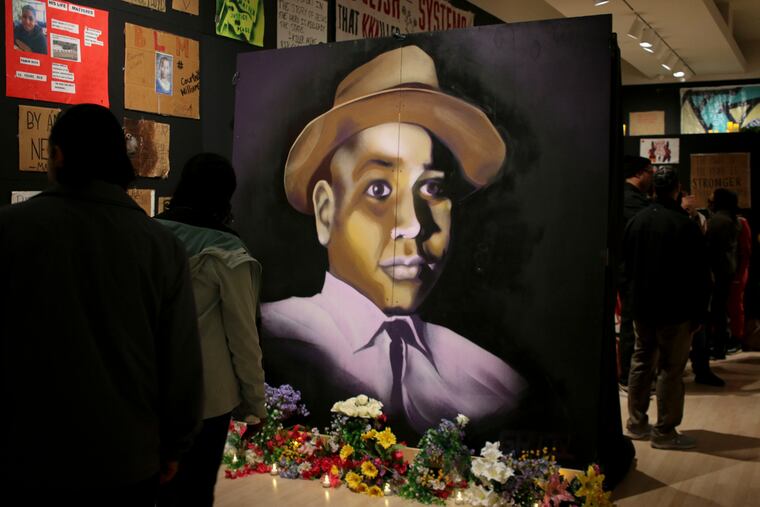A former Temple U law professor speaks about how the Emmett Till murder trial shaped the Civil Rights Movement
Ronald Collins, author of Tragedy on Trial, about Emmett Till's murder, will be part of a National Constitution Center discussion Thursday with Janai Nelson of the NAACP Legal Defense Fund.

Three days. That’s how long 14-year-old Emmett Till, a Black teen from Chicago, had been in Money, Miss., to visit with relatives for the summer before a trip to a small grocery store would lead to Till’s kidnapping and murder on Aug. 28, 1955.
The kidnapping, beating and murder of Till, for “whistling at a white woman” would become an international story and a turning point in the modern-day Civil Rights Movement.
That’s what Ronald Collins, a retired law professor and the author of a new book,Tragedy on Trial: The Story of the Infamous Emmett Till Murder Trial, believes.
At noon Thursday, in one of the National Constitution Center’s “America’s Town Hall” programs, Collins will discuss “The Legacy of Emmett Till: From Tragedy to Activism,” with Janai Nelson, president and director-counsel of the NAACP Legal Defense Fund.
The program will be moderated by Thomas Donnelly, chief content officer at the Constitution Center. To attend the free, virtual discussion, people should register here. Or visit https://constitutioncenter.org/ to register.
“Both Ron and Janai have done so much to educate Americans about the history of the Civil Rights Movement and we’re looking forward to learning from both of them,” Jeffrey Rosen, president and CEO of the National Constitution Center, said in an email.
“Rosa Parks said this {Till murder} is what influenced her to take a stand in the Montgomery Bus Boycott, “ Collins said in an interview. “This is really a turning point in the modern Civil Rights movement.”
The Montgomery Bus Boycott in Alabama began on Dec. 5, 1955, a few days after Parks was arrested on Dec. 1 for refusing to give up her seat to a white man.
Only a few months earlier, on Sept. 23, Roy Bryant and his half-brother, John William “J.W.” Milam, the two white men charged with killing Till and tossing his body in the Tallahatchie River, had been found not guilty by an all-white jury.
» READ MORE: Julia Chaney-Moss, sister of slain civil rights worker James Chaney, talks ‘the other Philadelphia’
Collins, who once taught constitutional law at Temple University’s Beasley School of Law, had just retired from teaching at the University of Washington School of Law in Seattle, when he and his wife embarked on a tour of Civil Rights sites in the South, four years ago, just before the COVID-10 pandemic struck.
He said they were inside the Tallahatchie County Courthouse in Sumner, Miss., on the tour listening to a guide talk about the Till murder trial, when he realized he did not know much about the case.
“I was sitting in the courtroom thinking, ‘This is where it happened,’ " Collins told the Inquirer. Collins left the court room “wanting to hear more about the story.
“That night, I was on the Internet starting my research. I wasn’t planning to write a book at that point. I just wanted to know more about the trial.”
As a retired professor, Collins, who lives in Lewes, Del., said he couldn’t stop researching the case. What he learned was that the official transcript of the trial had been lost for nearly 50 years, and had not resurfaced until 2004. Then, an original transcript was lost in a flood and it was discovered that a former juror had a copy of a copy. He said the FBI has scrutinized the transcript and authenticated it. But it was not made public until 2007.
The court reporter during the trial had not bothered to record the closing arguments in the case. Collins said he had to go to the Black newspapers and magazines that covered the trial to piece together the closing arguments.
“A lot of things were hidden about that case, he said. Even the famous account of the trial by the journalist William Bradford Huie that appeared in Look Magazine in 1956, was later found to have been falsified, with other suspects who took part in Till’s murder kept out of the story. It was later found that Huie had paid the two defendants, Milam and Bryant. It was Bryant’s wife, Carolyn whom Till had whistled at. Carolyn Bryant, who years later admitted Till had not touched her, died in April 2023.
Collins said if any of the major case books about constitutional law that are taught in law schools mention the Emmett Till case, they don’t go beyond a sentence or two. The reason is because it was not a U.S. Supreme Court case.
“If you’re studying civil rights or constitutional law, you can’t simply limit it to what the Supreme Court does,” Collins said.
“The constitution doesn’t just exist in a document or case law, it’s in what people did, like when Mamie Till-Bradley (later Mamie Till-Mobley) decided to have an open casket funeral for her son,” he said. “It’s when the photographer David Jackson went to the funeral home after Till’s body was taken back to Chicago and took pictures of his beaten and disfigured body, and it’s when Robert Johnson, the publisher of Ebony and Jet magazines made the decision to publish those photos.
“What the Black press was doing wasn’t reaching the Caucasian world,” he said. “But the fact that Mamie Till had the open casket funeral, that meant the rest of the world saw what was happening to Black people.”